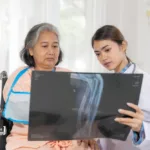
Why Is Overmedication in Seniors a Growing Concern?
December 6, 2024
How Does Osteoporosis Weaken Bones in Older Adults?
February 18, 2025Caring for elderly loved ones is a responsibility that becomes more challenging when distance is concerned. Due to work, education or personal circumstances, many people find themselves living far from their aging parents or grandparents. While you may not always be physically present, there are ways to prepare for and effectively manage emergencies involving elderly family members from far away.
Handling elderly care emergencies when you’re far away can be stressful, but there are steps you can take to ensure the person receives help quickly. Here’s a complete guide to help you handle such situations with confidence and care.
1. Assess the Situation
- Stay Calm: Try to remain calm to think clearly.
- Gather Information: Contact the elderly person directly (if possible) to understand the situation. If they can’t speak, try to reach someone nearby who can assess the situation (neighbors, family members, or caregivers).
- Understand the Nature of the Emergency: Determine if it’s a medical emergency, a fall, or something else. Knowing the type of emergency helps in deciding the next steps.
2. Call for Immediate Help
- Dial Emergency Services: If it’s a medical emergency, call emergency services to send medical staff.
- Provide Details: Give the staff all the necessary information about the elderly person’s condition, address, and any other relevant details (medical history or medications).
3. Use Technology for Assistance
- Medical Alert Systems: If the elderly person wears a medical alert device, ask them to press the button if it hasn’t been done already. These systems will alert emergency services or a specified contact.
- Smart Home Devices: If they have a smart home setup, you can use voice-controlled systems (Alexa, Google Assistant) to make calls or send messages to nearby contacts or emergency services.
- Health Monitoring Apps: Some devices and apps (like fall detectors, heart monitors, or medication trackers) can send alerts directly to elderly care services. Ensure your elderly loved one has these set up, if possible.
4. Contact Neighbors or Friends Nearby
- Call a Trusted Person: Reach out to neighbors, friends, or relatives who live close to the elderly person to check on them and offer assistance.
- Coordinate with a Caregiver: If the elderly person has a caregiver, contact them to ensure they are providing the necessary help or taking them to a healthcare facility.
5. Arrange for Remote Support
- Virtual Medical Assistance: If available, schedule a virtual consultation with a doctor or healthcare provider. Some telemedicine services can guide you or others through first aid steps or help assess whether the situation requires immediate transport to the hospital.
- Arrange Transportation: If the elderly person needs to go to the hospital or clinic, you may need to arrange transportation for them. Many areas have specialized transport services for elderly people which can be scheduled online or via phone.
6. Follow Up Regularly
- Check on Them: If possible, keep in contact with the elderly person or the person assisting them to monitor their condition.
- Coordinate with Healthcare Providers: If they are being treated in a hospital or clinic, try to stay in touch with the healthcare providers for updates.
7. Prepare for Future Emergencies
- Emergency Plan: Create a comprehensive emergency plan for elderly care. Include a list of emergency contacts, healthcare providers, important medical information, and preferences.
- Keep Important Numbers Handy: Maintain a list of emergency numbers, including local hospitals, doctors, ambulance services, and any other contacts that may be needed.
- Set Up Regular Check-ups: Schedule regular phone calls or visits to ensure that everything is fine and to offer support in case of any issues.
8. Ensure Access to Funds
- Check Financial Accounts: you might need to arrange for financial assistance for your parents or your travel home. Set up online banking or mobile payment systems to manage expenses remotely.
- Power of Attorney: If you’re responsible for managing their finances, consider having a power of attorney in place to make financial decisions on their behalf in case of an emergency.
- Emergency Fund: Have an emergency fund ready for unexpected expenses, including medical bills, transportation costs, or necessary home modifications.
Handling an elderly emergency from a distance is challenging, but with proper planning and resources, you can manage these situations effectively. Staying prepared, adapting technology and building a strong support network helps you to ensure your loved ones receive the care they need, even when you’re far away. Remember, proactive measures today can save precious time and stress during an emergency tomorrow.
FAQs
1. What should I do if I get a call about an emergency involving my elderly loved one?
Stay calm and gather all available information. Contact local emergency services and explain the situation. If possible, reach out to a trusted person nearby (family, friends, neighbors) to check on them and provide support until help arrives.
2. How can I ensure my elderly loved one is safe while I’m away?
Set up emergency contacts and regular check-ins. You can also consider monitoring devices (such as medical alert systems, wearable trackers, or smart home technology) that allow you to track their health and well-being remotely.
3. Should I consider hiring a caregiver or home health aide for additional support?
If your elderly loved one needs ongoing care or assistance, hiring a geriatrician near you or home health aide can provide peace of mind. Look for trusted agencies or services that offer qualified caregivers with experience in elderly care.

